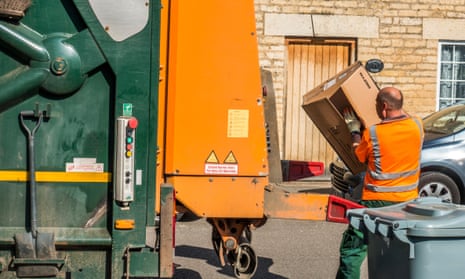Residents face years more swingeing cuts to local services, from social care to libraries, bin collections and bus routes, as at least 25 councils teeter on the brink of bankruptcy, the public spending watchdog has warned.
According to the National Audit Office, the vast majority of English councils (94%) expect to cut spending next year to meet legal duties to balance their budgets. The “scarring” of council balance sheets since the coronavirus pandemic began has been so fierce that half of town halls do not expect their finances to recover until at least the middle of the decade.
The watchdog said a decade of austerity for local government, which has reduced councils’ spending power by a third at a time when demand for services has soared, had left local authorities more vulnerable to the impact of the pandemic than they otherwise would have been.
Social care services for older and disabled adults are likely to be in line for cuts from April, along with special educational needs and homelessness spending, the NAO reported. Libraries, theatres and community centres face closure, bins would be collected less frequently, and subsidies propping up bus routes will shrink.
The warning of continued cuts to local services came as many councils prepare to increase council tax bills by up to 5% from April, and despite claims from ministers that austerity is over. The NAO urged ministers to draw up a programme to stabilise councils’ battered finances in the long term.
“Authorities’ finances have been scarred and won’t simply bounce back quickly,” said Gareth Davies, the head of the NAO. “Government needs a plan to help the sector recover from the pandemic and also to address the longstanding need for financial reform in the sector.”
The chair of the Commons public accounts committee, Meg Hillier MP, warned that local councils were “not out of the woods” despite billions of pounds in emergency funding in recent months.
She said: “Central government support has provided an important lifeline to keep local authorities’ heads above water. But the last year has taken its toll. Local authorities were already over-stretched and now, with reserves depleted, many will have to slash service budgets to balance their books.”
Councils have spent an estimated extra £6.9bn this financial year on Covid-related services, said the NAO. Authorities have seen costs rise as a result of social distancing and the need for personal protective equipment, especially in adult social care, while taking on extra responsibilities to house rough sleepers, support those shielding at home and help with testing, tracing and control of outbreaks.
In addition, they incurred £2.9bn losses from unpaid council tax and business rates, while lockdowns led to income losses of £695m from car parking fees, and £554m from leisure centres, theatres and museums.
Ministers have provided £9.1bn in emergency help but the resulting £600m funding gap has left a third of councils with significant holes in their budgets. This has led to authorities accusing ministers of breaking promises made early in the pandemic to “do whatever is necessary” to support councils.
The NAO said that while the government’s extra Covid funding had “averted system-wide financial failure”, the financial position of councils remained a concern, with many using increasingly depleted reserves and service cuts to shore up budgets. “The outlook for next year is uncertain,” the NAO concluded.
Just one council – Croydon – declared itself insolvent in the past year, but five others – Wirral, Luton, Eastbourne, Bexley and Peterborough – have between them sought and received £109m in government bailout loans to keep them afloat. Ministers approved a £120m emergency loan to Croydon this week.
Both Slough and Nottingham have sought £10m and £30m respectively in bailout cash from the government, and are awaiting decisions. However, the government has refused to say how many other councils have approached it for emergency loans to avoid section 114 insolvency notices.
James Jamieson, chairman of the Local Government Association, said: “We continue to call on government to meet – in full – all cost pressures and income losses incurred by councils as a result of the pandemic. Public finances are undoubtedly under huge strain but investment in our local services will be vital for our national economic and social recovery.”
Steve Reed MP, Labour’s shadow communities and local government secretary, said: “The Conservatives cut council funding by 60% over the past decade so town halls were already on the brink of financial disaster even before the pandemic. Now the government is forcing local authorities to hike up council tax so hard-pressed families are left to pay the price of the Conservatives’ broken promises.”
A spokesperson for the Ministry for Housing, Communities and Local Government said: “As the NAO acknowledges, the government acted swiftly and flexibly to ensure councils continued to deliver vital services throughout the pandemic. Councils continue to play a critical role and we have committed over £35bn to help them support communities and local businesses during this time.”
